Find the best Futures Trading Broker with low commissions, for small or large accounts, with our WR Trading comparison. However, choosing the right futures trading broker can feel overwhelming because each provider differs in margin requirements, commission structures, available markets, and platform reliability.
To remove that uncertainty, we tested Futures Brokers under real trading conditions, compared their trading fees (commissions), and evaluated how they perform for small account holders, beginners who need clear, simple platforms, and professional traders who require advanced analytics. This approach allowed us to identify brokers that not only advertise competitive terms but also deliver consistent performance in areas that directly impact profitability and risk management.
See here our Top 10 Futures Trading Brokers compared in the table below:
Broker:
Futures Fees:
Advantages:
Account:
$0.75 per micro contract
$1.75 per standard & mini contract
(No Platform Fees + Market Data Fees)
- Open an Account in under 5 minutes
- Multiple Exchanges (CME, CBOT, NYMEX, & more)
- MT5, TradingView
- Multiple Regulations
- Minimum Deposit: $100
- Personal Support
- Day Trading Margin 2%
- Best Overall for Beginners & Professionals
$0.49 per micro contract
$0.89 per standard & mini contract
(Only available for US Traders)
- Multiple regulations
- $100 Minimum deposit
- Plus500 WebTrader, Plus500 App
- Global Payment Methods
- No Market Data Fees
- Best For US Traders
$0.22 – $1.50 per micro contract
$1 – $3 per standard & mini contract
- Multiple platform integrations, e.g. TradingView
- Commission starting from $0.22 per side
- Demo Account available
- CFTC regulated
- EdgeProX, EdgeEQ
- Best For Multiple FCMs
Based On Trading Volume
Customised Trading Deals
- Non-bank Futures Commission Merchant
- Demo Account available
- Multiple Regulations
- Wedbush Futures Trading Platform, CQG, TT Trading Platform, CTS T4, R Trader Pro, R Trader
- Best For Big Accounts
$0.25 per micro contract
$0.85 per standard & mini contract
(Can Be Lowered By High Volume Trading)
- No Minimum Deposit
- No Platform Fees
- Demo Account available
- IBKR GlobalTrader, IBKR Desktop, Trader Workstation (TWS), & more
- Best For Professionals
$0.60 per micro contract
$2.00 per standard & mini contract
- $100 Minimum Deposit
- Super Low Day Trading Margin (1.6%)
- CFTC regulated
- MetaTrader 5, Quantower, TradingView, & more
- Fast Chat Support
- Best For Multiple Platforms
$0.39 per micro contract
$0.99 per standard & mini contract
(Volume Tiered)
- Demo Account available
- Ironbeam App & Trading Platform, TradingView, Sierra Chart, CQG, Jigsaw, & more
$0.50 per micro contract
$1.50 per standard & mini contract
- No Minimum Deposit
- 10% Intraday Margin
- Multiple regulations
- Demo Account available
- TradeStation Platform
- 600+ Futures
$0.39 per micro contract
$1.29 per standard & mini contract
(Can Be Lowered By Special Plans)
- Futures Broker
- No Minimum Deposit
- 2% Day Trading Margin
- NinjaTrader Desktop, Web, and mobile
- Exchanges: CME, CBOT, NYMEX, COMEX, & more
$0.09 per micro contract
$0.25 per standard & mini contract
- Futures, Mini Futures, Micro Futures
- MT5, TradingView, Sierra Chart, Quantower, MultiCharts, Jigsaw
- Regulation: CFTC, NFA
- Multiple Exchanges (CME, CBOT, NYMEX, & more)
- Best For Low Costs
Shortlist of Futures Trading Brokers and Their Key Benefits:
- AvaFutures – Best overall with low minimum deposits and high user-friendliness
- Plus500 US – Best for American traders with straightforward pricing and regulated access.
- EdgeClear – Industry-leading low commissions for active futures traders.
- Wedbush – Strong regulatory compliance with $3.5 billion in client funds.
- Interactive Brokers – Global futures access through one account and platform.
- AMP Futures – Extensive platform variety with ultra-low intraday margins.
- IronBeam – Advanced proprietary technology with support for algorithmic trading.
- TradeStation – Powerful desktop platform with integrated strategy automation.
- NinjaTrader – Deep platform customisation and low commission subscription plans.
- Optimus Futures – Wide platform choice with competitive micro and E-mini pricing.
See our complete Futures Platform Comparison via YouTube below:
List of the Best 10 Future Trading Brokers
Using the right broker can make a significant difference when trading futures, which is why we tested and reviewed a wide range of platforms to see how they perform in real trading conditions. Our focus was on areas that matter most to futures traders, including trading costs, platform stability, margin policies, available exchanges, and customer support. Based on our tests, here are the brokers that stood out to us and earned their place as the best options in the industry.
1. AvaFutures
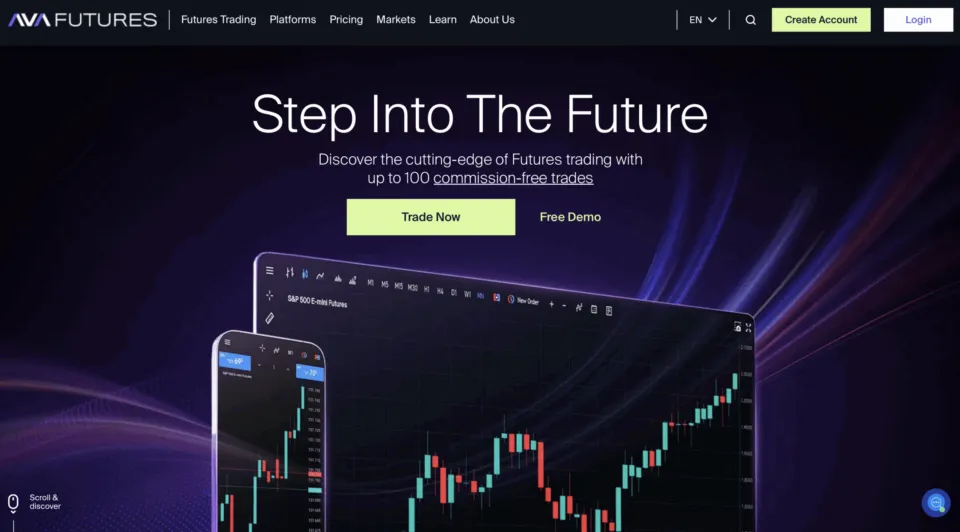
AvaFutures is our top pick at WR Trading, with a 5/5-star rating for its access to major U.S. exchanges and its low minimum deposit. Starting from just $100, traders can open an account and access CME, CBOT, NYMEX, and COMEX contracts with low commissions from $0.75 per micro and $1.75 per standard contract per side. This structure makes it accessible for testing strategies on micro-agreements and makes it the best futures broker for small accounts, while still being efficient for larger trades.
The MT5 and TradingView platforms ensure a smooth trading process, offering depth of market, one-click trading, and multi-timeframe charting tools needed for futures strategies. The broker’s strong regulatory background includes the Central Bank of Ireland, CySEC, ASIC, FSCA, FSA, FFAJ, ADGM, ISA, and BVI FSC, which provides a level of trust often missing in smaller providers.
Futures traders also benefit from an educational academy that breaks down contract specifications, rollover handling, and margin requirements, helping users better prepare for live trading. AvaFutures is not available to U.S. residents, but for non-U.S. traders, it offers a reliable gateway into the leading futures exchanges with a transparent cost structure and accessible platform options. Our primary concern was that support only works 24/5, which means it’s unlikely you’ll get a fast response on the weekend.
| Feature | Details |
|---|---|
| Offers Futures? | Yes |
| Mini Futures, Micro Futures | Yes |
| Minimum Deposit | $100 |
| Day Trade Margin From | Exchange minimums apply |
| Commission | $0.75 per micro contract $1.75 per e-mini/standard contract |
| Trading Platforms | MetaTrader 5 and TradingView |
| Exchanges | CME, CBOT, NYMEX, COMEX, Eurex EU Futures, and ICE |
| Customer Support | 24/5 live chat, phone, and email support |
| Available in USA | No |
| Educational Content | AvaTrade Academy with video lessons, articles, and webinars |
| Regulation | Central Bank of Ireland, CySEC, ASIC, FSCA, FSA, FFAJ, ADGM, ISA, and BVI FSC |
2. Plus500 US
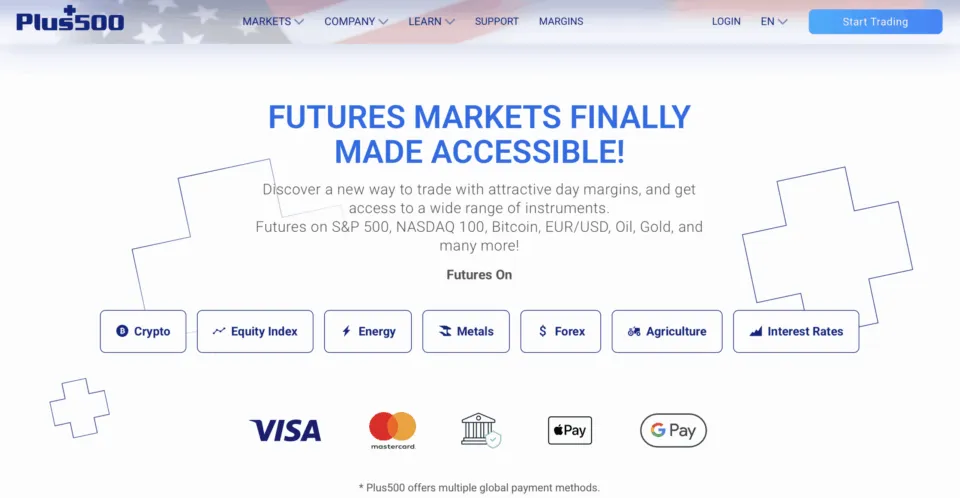
Plus500 US stands out because it’s built specifically for American traders seeking exchange-listed futures contracts, making it our second-best overall option. The broker provides access to CME, CBOT, NYMEX, COMEX, ICE, CFE, and Eurex, ensuring coverage across indices, metals, and energy contracts. Commissions are fixed at $0.49 per micro and $0.89 per standard contract per side, and intraday trade margins start as low as $50 on micros, making it practical for intraday strategies where capital efficiency is essential.
The proprietary trading platform is designed for ease of use, allowing traders to manage open positions, view margin requirements, and adjust stops. The Plus500 Futures Academy provides educational content in both video and article formats, covering topics such as order types and contract expiration.
| Feature | Details |
|---|---|
| Offers Futures? | Yes |
| Mini Futures, Micro Futures | Yes |
| Minimum Deposit | $100 |
| Day Trade Margin From | $50 |
| Commission | $0.49 per micro contract $0.89 per E-mini contract |
| Trading Platforms | Available in the USA |
| Exchanges | CME, CBOT, NYMEX, COMEX, ICE, CFE, and Eurex |
| Customer Support | 24/7 via chat and email |
| Available in USA | Yes, but only for US Traders |
| Educational Content | Plus500 Futures Academy with articles and tutorials |
| Regulation | CFTC and NFA |
3. EdgeClear
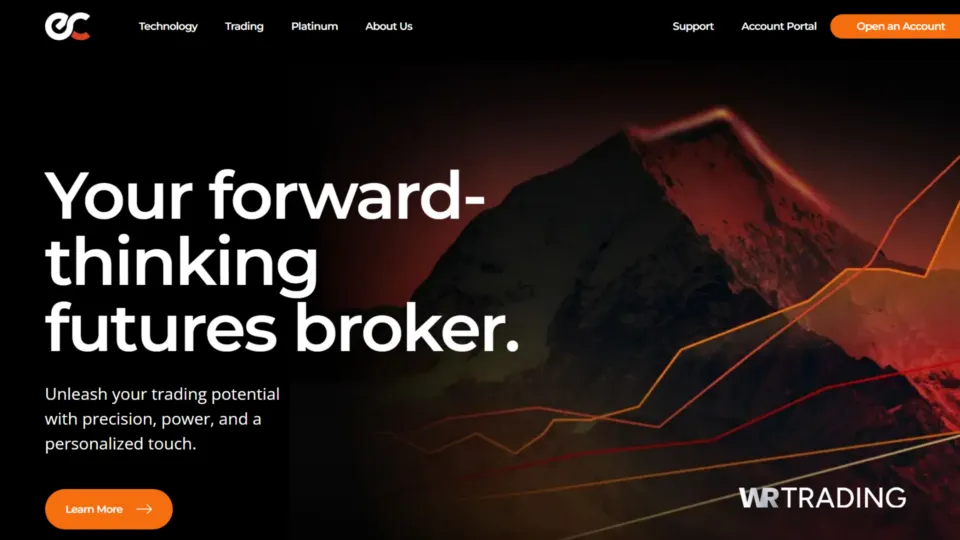
EdgeClear is one of the best cost-effective futures trading brokers in our list, with commissions starting from $0.22 per side. This makes it one of the lowest in the industry for active traders, while day trade margins remain competitive at $50 for micros and $500 for E-minis. More importantly, EdgeClear integrates with top platforms, including Sierra Chart, EdgeProX, Bookmap, TradingView, and Jigsaw, allowing traders to use order flow, footprint charts, and advanced execution tools that help refine strategies.
The broker connects clients to CME, CBOT, NYMEX, COMEX, ICE, Eurex, SGX, and HKEX, providing access to global liquidity across U.S., European, and Asian markets. Support is available via phone, chat, and email throughout the trading week, and webinars and tutorials help traders make better use of specialised platforms such as order flow software. Also, compared to other futures trading brokers, Edgeclear is less beginner-friendly, as the minimum deposit is $5,000.
| Feature | Details |
|---|---|
| Offers Futures? | Yes |
| Mini Futures, Micro Futures | Yes |
| Minimum Deposit | $1,500 for micro accounts, $5,000 for standard accounts |
| Day Trade Margin From | As low as 25 – 50% of exchange margin |
| Commission | $0.22 – $1.50 per micro contract $1 – $3 per standard & mini contract (depending on the clearer) |
| Trading Platforms | EdgeProX, Sierra Chart, Bookmap, Jigsaw, TradingView, MultiCharts, and TT |
| Exchanges | CME, CBOT, NYMEX, COMEX, Eurex, ICE, SGX, HKEX |
| Customer Support | 24/5 via phone, chat, and email |
| Available in USA | Yes |
| Educational Content | Blog, guides, webinars, and community resources |
| Regulation | CFTC and NFA |
4. Wedbush
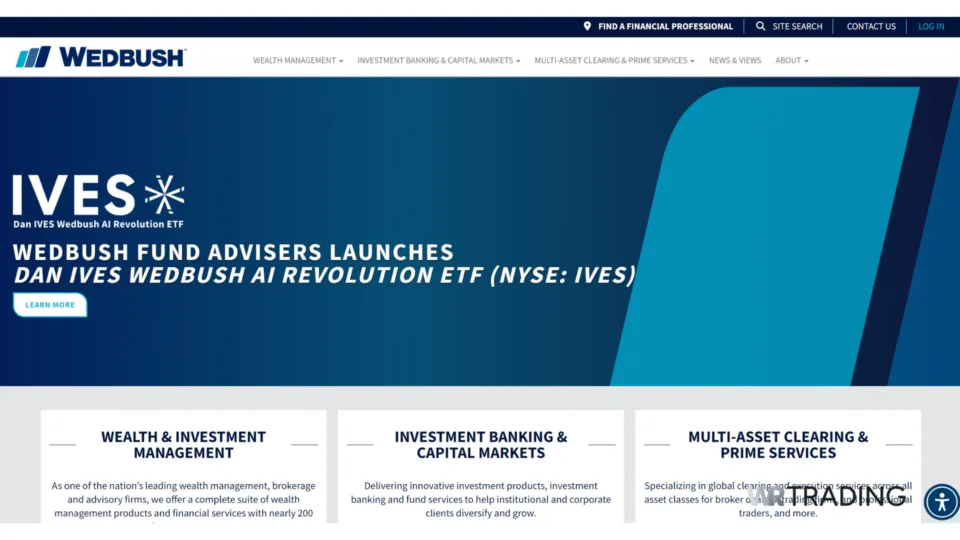
Wedbush has the best regulatory compliance and financial stability, with $3.5 billion in segregated funds. It holds licenses from the SEC, NFA, and FINRA, making it a trustworthy platform. This broker offers a selection of trading platforms, including CQG and the Wedbush Futures Trading Platform, designed for institutional and individual traders.
Wedbush operates with exchange-set margin requirements rather than offering aggressive day margins, which appeals to traders seeking conservative risk management. Commission rates are quoted based on account size and volume, allowing larger traders to negotiate more competitive terms. We didn’t like that Wedbush has no section about trading costs before signing up, which makes them a little less transparent than other brokers.
Exchange coverage includes CME, CBOT, NYMEX, COMEX, ICE, Eurex, LME, and SGX, which enables trading across equities, energy, metals, and agricultural products. A 24-hour trade desk and technical support ensure traders have access to assistance throughout global market hours. At the same time, client reports and clearing services meet the needs of professionals who require detailed transparency. Wedbush is best suited for traders who want the reliability of a well-capitalised FCM with access to a wide range of platforms and exchange memberships.
| Feature | Details |
|---|---|
| Offers Futures? | Yes |
| Mini Futures, Micro Futures | Yes |
| Minimum Deposit | Not published, case by case |
| Day Trade Margin From | Exchange minimum (full overnight margin) |
| Commission | Available in the USA |
| Trading Platforms | CQG, Trading Technologies (TT), Rithmic, CTS T4 |
| Exchanges | CME, CBOT, NYMEX, COMEX, ICE US, Eurex, LME, and SGX |
| Customer Support | 24/5 via phone, chat, and email |
| Available in USA | Yes |
| Educational Content | Limited, mostly consulting and risk guidance |
| Regulation | SEC, FINRA, CFTC, and NFA |
5. Interactive Brokers
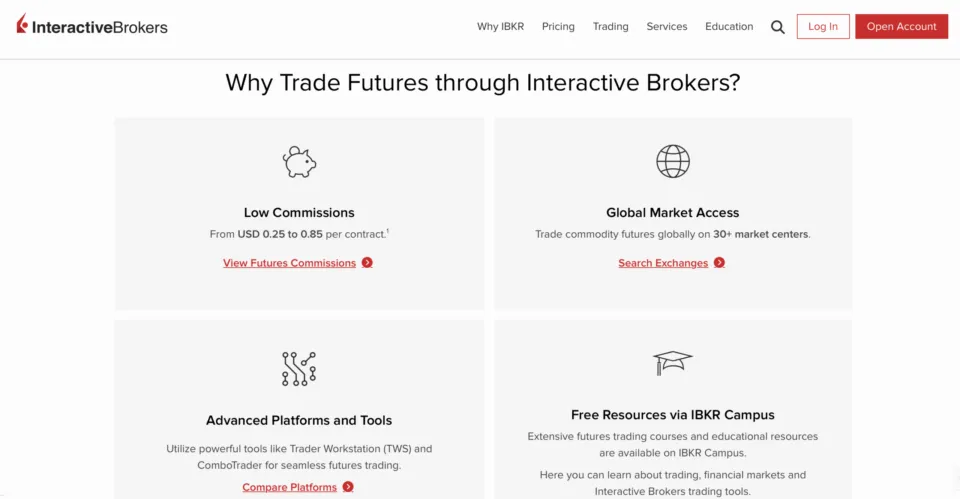
Interactive Brokers is one of the strongest choices for futures traders who need global access through a single account. Commissions start at $0.85 per standard contract and $0.25 per micro contract per side, which are competitive for a broker offering access to over 30 futures exchanges, including CME, CBOT, NYMEX, COMEX, ICE, Eurex, SGX, and Euronext.
This reach allows traders to rotate strategies across U.S., European, and Asian markets without maintaining multiple accounts. Trader Workstation provides advanced risk controls, bracket orders, and customizable dashboards that help traders track multi-contract positions with precision.
IBKR also supports web and mobile platforms with real-time margin monitoring, and its data feed offers accurate market depth across supported exchanges. Education is supported by IBKR Campus and live webinars, providing traders with resources on both contract mechanics and platform use.
| Feature | Details |
|---|---|
| Offers Futures? | Yes |
| Mini Futures, Micro Futures | Yes |
| Minimum Deposit | $2,000 |
| Day Trade Margin From | $50, depending on the contract |
| Commission | $0.85 per standard contract $0.25 per micro (Can Be Lowered By High Volume Trading) |
| Trading Platforms | Trader Workstation, WebTrader, and IBKR Mobile |
| Exchanges | CME, CBOT, NYMEX, COMEX, ICE, Eurex, SGX, and Euronext |
| Customer Support | 24/7 phone, chat, and email |
| Available in USA | Yes |
| Educational Content | IBKR Campus, webinars, guides |
| Regulation | SEC, FINRA, CFTC, NFA, FCA, CIRO, CBI, ASIC, SFC, and MAS |
6. AMP Futures
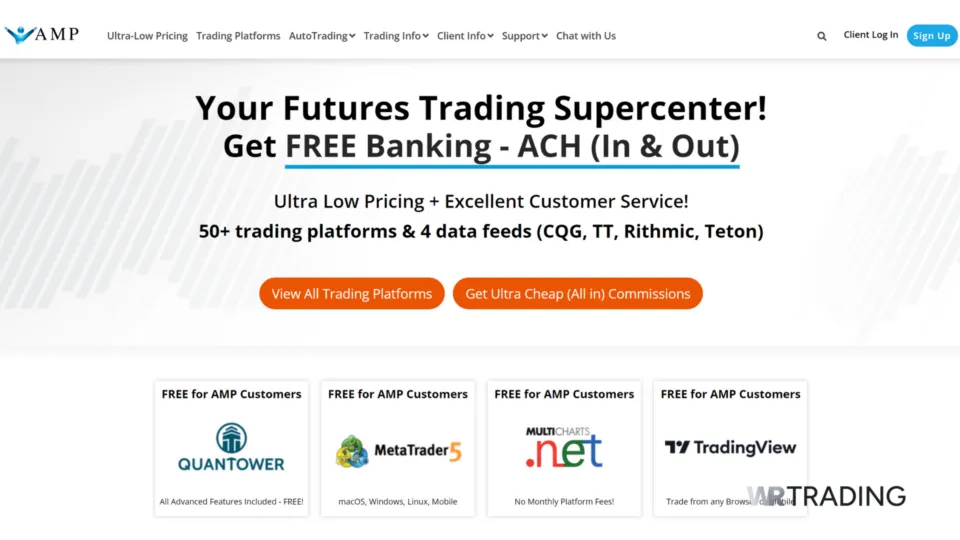
AMP Futures is best known for its platform variety and some of the lowest intraday margins in the market. It supports over 40 platforms, including MT5, TradingView, Sierra Chart, MultiCharts, Quantower, and Jigsaw, allowing traders to build highly customised setups for charting, automation, and order flow analysis.
Day trade margins start at $40 for micros, and commissions are kept competitive at around $0.60 per side, making it great for high-frequency strategies. Exchange connectivity includes CME, CBOT, NYMEX, COMEX, ICE, and CFE, ensuring investors can trade indices, metals, energy, and volatility products.
The broker also offers free trial data to test multiple platforms before committing funds, lowering the barrier for traders who want to experiment with different execution tools. Combined with 24/5 support and detailed platform tutorials, AMP Futures is our choice for traders who wish to minimise costs while retaining complete control over their trading software.
| Feature | Details |
|---|---|
| Offers Futures? | Yes |
| Mini Futures, Micro Futures | Yes |
| Minimum Deposit | $100 |
| Day Trade Margin From | From $40 (micro E-minis) |
| Commission | $0.60 per micro contract $2.00 per standard & mini contract (Can be lowered by high volume) |
| Trading Platforms | MetaTrader 5, TradingView, Sierra Chart, Quantower, MultiCharts, and Jigsaw |
| Exchanges | CME, CBOT, NYMEX, COMEX, ICE US, CFE |
| Customer Support | 24/5 phone, email, and chat support |
| Available in USA | Yes |
| Educational Content | FAQ, tutorials, webinars |
| Regulation | CFTC and NFA |
7. IronBeam
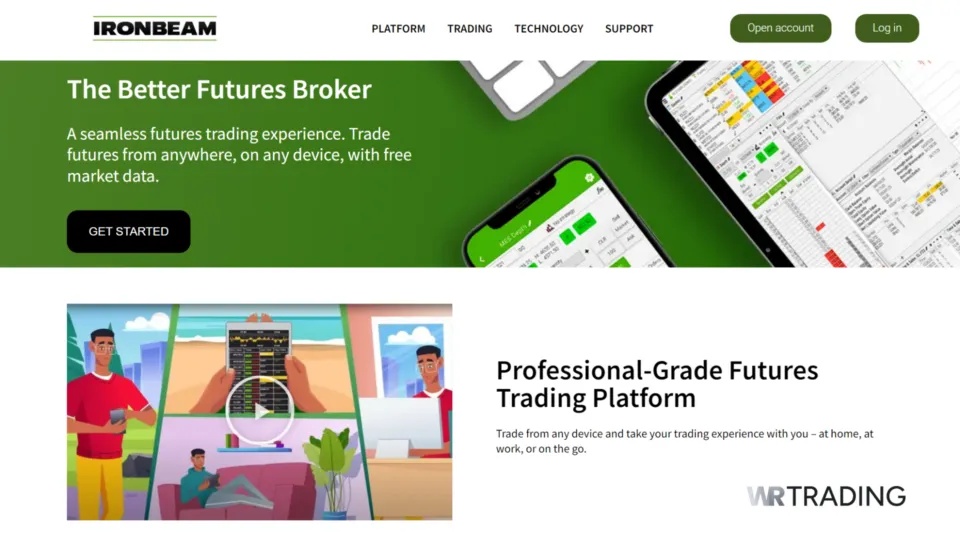
IronBeam provides direct market access with a proprietary trading platform alongside third-party integrations. Its in-house platform is built for stability, offering server-side order management, one-click execution, and real-time market depth, while connections to TradingView, Sierra Chart, MotiveWave, and Jigsaw expand options for order flow and charting analysis.
Day trade margins are set at $50 for micros and $500 for E-minis, and commissions start from $0.39 per micro per side during promotions, which gives cost-sensitive traders a reliable entry point. The broker offers direct access to CME, CBOT, NYMEX, COMEX, ICE, and Eurex, ensuring coverage of major futures markets.
Support includes 24-hour phone and email access, as well as a knowledge base and community forum for self-learning. Suppose you value the combination of proprietary technology and low margins. In that case, IronBeam is an excellent choice in our opinion at WR Trading as it delivers a setup that balances flexibility with direct execution.
| Feature | Details |
|---|---|
| Offers Futures? | Yes |
| Mini Futures, Micro Futures | Yes |
| Minimum Deposit | $0 to open (funds required to meet margin) |
| Day Trade Margin From | Reduced intraday margins available (varies by contract) |
| Commission | $0.39 per micro contract $0.99 per standard & mini contract |
| Trading Platforms | TradeStation Desktop, Web Trading, Mobile |
| Exchanges | CME, CBOT, NYMEX, COMEX, ICE U.S., and Eurex |
| Customer Support | Phone, email, and live chat |
| Learning Centre with webinars, videos, and articles | Yes |
| Educational Content | Learning Center with webinars, videos, and articles |
| Regulation | SEC, CFTC, FINRA, NFA, and SIPC |
8. TradeStation
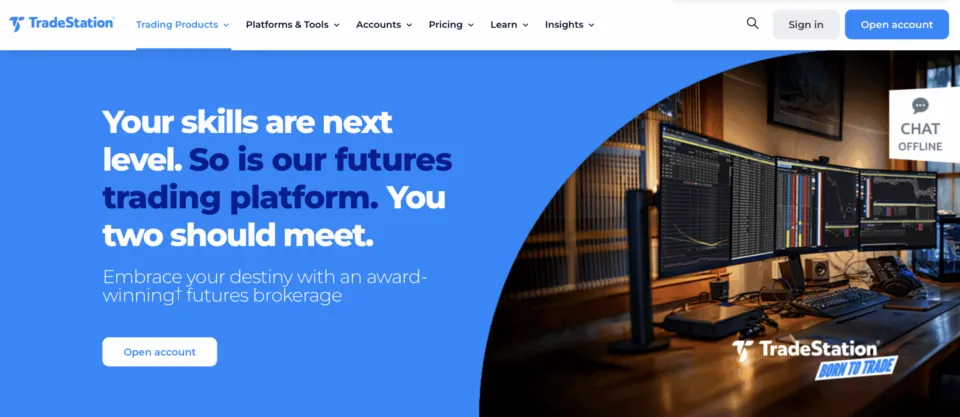
TradeStation has an excellent reputation for its advanced desktop platform, which is a significant draw for futures traders who want integrated strategy development and execution. EasyLanguage scripting enables building and testing rule-based trading systems directly on the platform, while its advanced charting and scanning tools provide a comprehensive market overview.
Commission pricing is simple at $1.50 per side for standard contracts and $0.50 per side for micros, and intraday margin programs allow traders to reduce capital requirements on active index contracts. Exchange access includes CME, CBOT, NYMEX, COMEX, ICE, and Eurex, providing exposure to global markets. We believe their education section and FAQs could be more in-depth to help beginners better understand futures trading and the TradeStation platform.
| Feature | Details |
|---|---|
| Offers Futures? | Yes |
| Mini Futures, Micro Futures | Yes |
| Minimum Deposit | $100 |
| Day Trade Margin From | From $40 (micro E-minis) |
| Commission | $0.50 per micro contract $1.50 per standard & mini contract |
| Trading Platforms | MetaTrader 5, TradingView, Sierra Chart, Quantower, MultiCharts, and Jigsaw |
| Exchanges | CME, CBOT, NYMEX, COMEX, ICE US, CFE |
| Customer Support | 24/5 phone, email, and chat support |
| Available in USA | Yes |
| Educational Content | FAQ, tutorials, webinars |
| Regulation | CFTC and NFA |
9. NinjaTrader
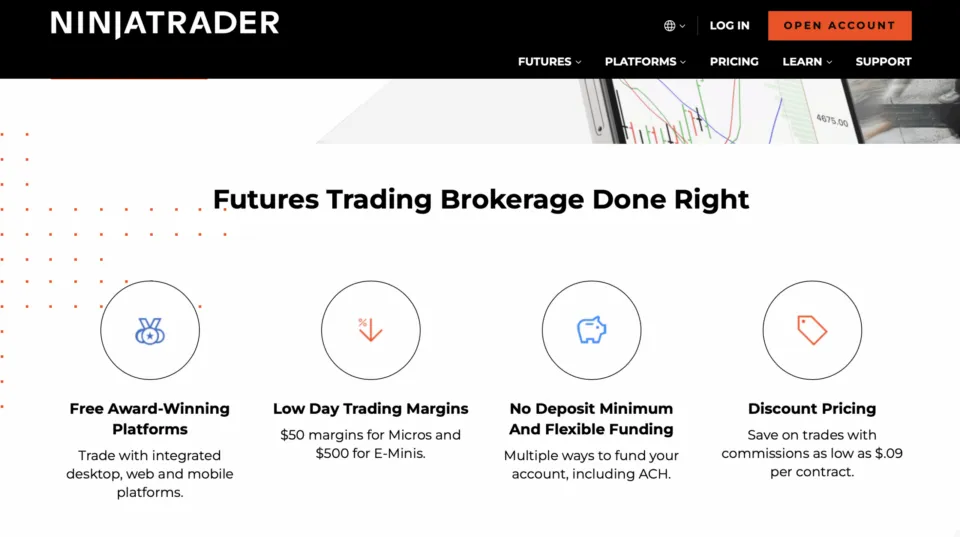
NinjaTrader is our pick for futures traders who want deep platform customisation with cost savings on active use. The desktop platform includes advanced charting, volume profiling, and the ability to code and backtest automated strategies, while the web and mobile versions allow for position management on the go. Day trade margins are set at $50 for micros and $500 for E-minis, giving traders the flexibility to efficiently size intraday positions.
Commissions start at $0.09 per micro and $0.59 per standard contract per side under subscription plans, making it one of the cheapest options for frequent traders. Exchange coverage spans CME, CBOT, NYMEX, COMEX, ICE, and CFE. Also, the futures trading broker is available in the United States and is regulated by the CFTC and NFA.
| Feature | Details |
|---|---|
| Offers Futures? | Yes |
| Mini Futures, Micro Futures | Yes |
| Minimum Deposit | No minimum to open |
| Day Trade Margin From | $50 on popular Micro contracts; $500 on E‑minis |
| Commission | $0.39 per micro contract $1.29 per standard & mini contract (Can Be Lowered By Special Plans) |
| Trading Platforms | NinjaTrader Desktop, Web, and mobile |
| Exchanges | CME, CBOT, NYMEX, COMEX, ICE U.S., and CFE |
| Customer Support | 24/5 technical support by phone, live chat, and email |
| Available in USA | Yes |
| Educational Content | Platform training videos, daily livestreams, how‑to articles, and blogs |
| Regulation | CFTC and NFA |
10. OptimusFutures
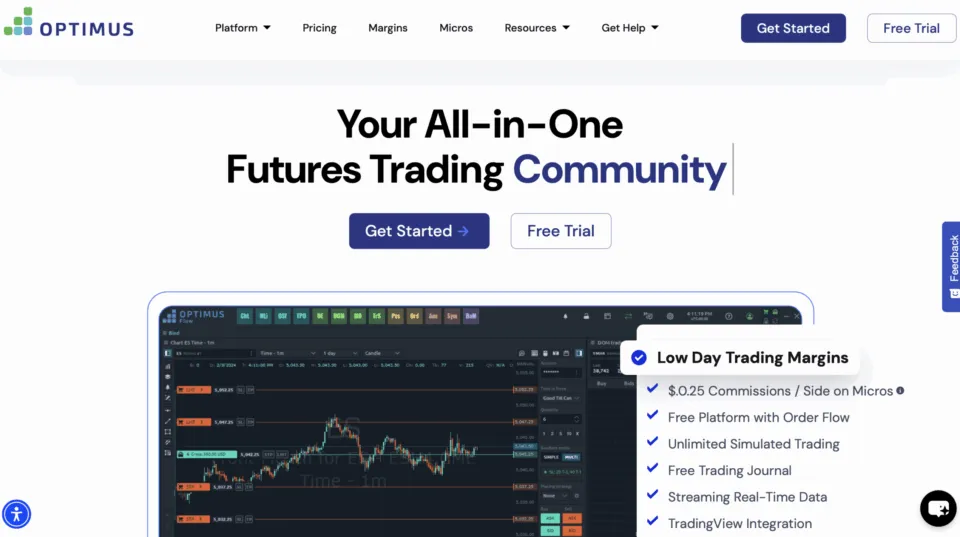
Optimus Futures takes our last spot as one of the best futures trading brokers because traders can choose from multiple platforms, including Optimus Flow, TradingView, Sierra Chart, Bookmap, and Rithmic. They provide full access to depth-of-market data, order flow visualisation, and automated strategy support.
Commissions begin at $0.25 per side for micros and $0.75 for standard contracts, while day trade margins are set at $50 and $500, making it a cost-effective choice for small and large accounts. Plus, the broker connects directly to CME, CBOT, NYMEX, COMEX, ICE, Eurex, and CFE, giving access to a wide range of liquid markets.
Support includes 24/5 phone, email, and live chat, along with a help centre and video tutorials to assist with setup and strategy refinement. Optimus Futures is our choice for traders who want platform options, consistent pricing, and strong exchange connectivity.
| Feature | Details |
|---|---|
| Offers Futures? | Yes |
| Mini Futures, Micro Futures | Yes |
| Minimum Deposit | From $500 (Micros); from $2,000 (E‑minis/standard) |
| Day Trade Margin From | $50 on Micros; $500 on E‑minis (contract‑specific) |
| Commission | $0.09 per micro contract $0.25 per standard & mini contract |
| Trading Platforms | Optimus Flow, Optimus Web, Optimus Mobile, TradingView, Sierra Chart, Rithmic, Bookmap, and others |
| Exchanges | CME, CBOT, NYMEX, COMEX, ICE U.S., Eurex, and CFE |
| Customer Support | Available in the USA |
| Available in USA | Yes |
| Educational Content | Guides, videos, blog, and community tutorials |
| Regulation | CFTC and NFA |
How We Tested the Best Future Trading Brokers:
To provide you with a reliable comparison of the top futures trading brokers, we conducted an in-depth evaluation based on several critical factors. Our goal at WR Trading was to identify brokers that offer a seamless trading experience, competitive pricing, extensive market access, and strong customer support. Below are the key criteria we used in our testing process:
Platform Usability
We tested each broker’s trading platform for ease of use, functionality, and the availability of advanced trading tools. A user-friendly interface is necessary for both beginners and experienced traders. We evaluated how easy the platform was to use, the availability of customisation options, and the overall user experience.
Platforms that offered advanced charting tools, technical indicators, and automated trading capabilities scored higher in our testing.
Commission and Fees
Cost is a significant factor for traders, so we compared each broker’s cost structure. This included examining commissions, spreads, and any hidden fees that could affect overall profitability. Brokers with transparent, competitive pricing structures, including low commissions and minimal additional fees were rated more favourably. We considered the value provided for the cost, ensuring that lower fees did not come at the expense of essential features or support.
Market Access
We assessed the range of futures markets available through each broker. A comprehensive selection of markets allows traders to diversify their strategies and take advantage of different market conditions. Brokers offering access to a wide variety of futures contracts, including commodities, indices, currencies, and stocks, were preferred. We looked at the ease of access to these markets and the quality of the market data provided.
Customer Support
The quality and availability of customer support were critical factors in our evaluation. We tested each broker’s support through direct interactions, assessing their responsiveness, knowledge, and willingness to help. Brokers with 24/7 support, multiple contact methods (such as phone, email, and live chat), and fast issue resolution scored higher. Excellent customer support is essential, especially for traders who may encounter urgent problems during market hours.
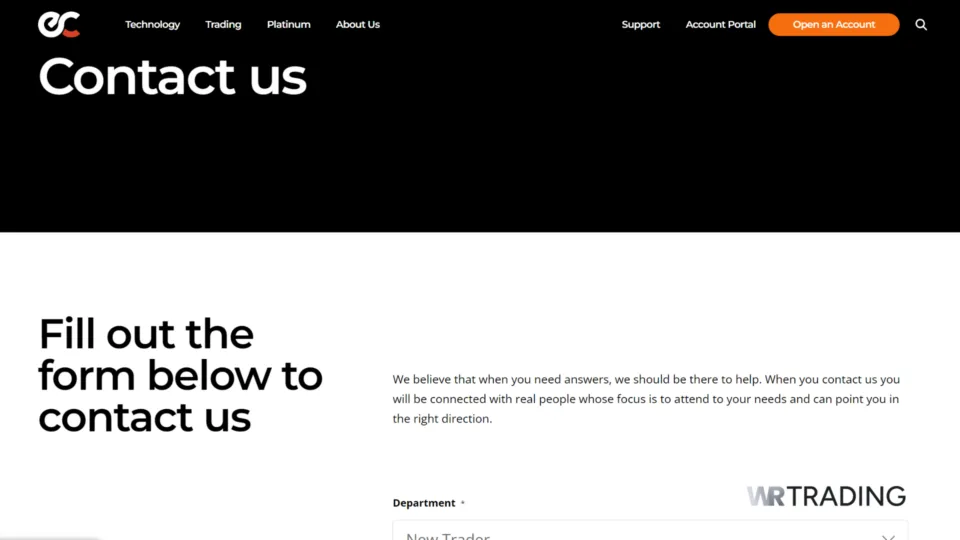
Regulatory Compliance
Regulatory oversight ensures brokers adhere to industry standards and provide a secure trading environment. We verified each broker’s regulatory status, ensuring they are licensed and regulated by reputable authorities such as the Commodity Futures Trading Commission (CFTC) and the National Futures Association (NFA) in the United States. Brokers with strong regulatory oversight and a history of compliance were rated higher, as they offer added security and peace of mind to traders.
Technology and Tools
The availability of advanced trading tools and technology was a significant factor in our evaluation. We examined each broker’s offerings, including charting software, risk management features, mobile trading apps, and automated trading capabilities. Brokers providing state-of-the-art technology and a comprehensive suite of tools to enhance the trading experience were rated higher. We considered the reliability and performance of these tools during our testing.
Educational Resources
Supporting trader development through educational materials and resources is essential. We evaluated the quality and comprehensiveness of each broker’s academic offerings, including webinars, tutorials, articles, and training programs. Brokers that provide a wealth of educational content to help traders improve their skills and knowledge were considered superior. This is important for beginners who are still learning the intricacies of futures trading.
What Are The Best Futures Brokers For Small Accounts?
In our opinion, AvaFutures is one of the best choices for small accounts because it allows traders to start with just $100 while still providing access to major U.S. exchanges like CME, CBOT, NYMEX, and COMEX. The ability to trade micro contracts with commissions starting at $0.75 per side makes it practical for traders who want to scale positions carefully while controlling risk.
Plus500 US is another strong option for smaller accounts from US Traders since it also has a $100 minimum deposit and very low day trade margins starting at $50 for micro contracts. Furthermore, the $0.49 per-side commission on micros allows active traders to manage positions efficiently without tying up large amounts of capital. See our complete Micro Futures Broker comparison here.
Which Futures Broker Is The Best For Beginners?
We recommend AMP Futures for beginners because it combines low barriers to entry with extensive platform flexibility. The $100 minimum deposit, day trade margins as low as $40 on micro E-minis, and over 40 supported platforms let new traders experiment with different tools before committing to a specific trading software.
Education is also an essential factor for beginners, and AMP provides tutorials and FAQs that cover platform use and contract basics. Other beginner-friendly futures trading brokers include Plus500 US, Interactive Brokers, and AvaFutures. AvaFutures is our next best option because its platform is beginner-friendly, and you can create an account in 5 minutes.
Which Futures Broker Is The Best For Professionals?
Interactive Brokers is one of the strongest platforms for professional futures traders because it connects to more than 30 global exchanges, provides proprietary trading software, and offers comprehensive trading tools. The main advantage for traders is the Trader Workstation, which offers advanced risk controls, bracket orders, and customizable dashboards.
This futures trading broker is for professionals managing multiple strategies across different markets who need real-time margin monitoring and high-quality market depth data to execute complex trading plans reliably.
How to Create a Futures Trading Account
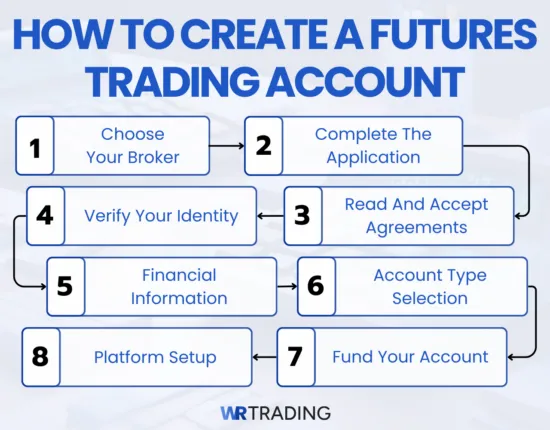
Creating a futures trading account involves several steps. Here’s a straightforward guide to get you started:
- Choose a Broker
- Complete the Application
- Read and Accept Agreements
- Verify Your Identity
- Financial Information
- Account Type Selection
- Fund Your Account
- Platform Setup
1. Choose a Futures Broker
Select a futures trading broker from our shortlist that best meets your trading needs. Consider factors like platform features, fees, and market access.
2. Complete the Application
Visit the broker’s website and complete the online application form. This requires providing personal information, such as your name, address, and date of birth.
3. Read and Accept Agreements
Carefully review the broker’s terms and conditions, margin agreements, and risk disclosures. Understanding these documents is essential as they outline your rights and obligations. Accept the agreements to proceed.
4. Verify Your Identity
Brokers must verify customer identities to comply with regulatory standards. You’ll need to upload copies of identification documents, such as a passport or driver’s license, and proof of address, like a utility bill or bank statement.
5. Financial Information
Provide details about your financial situation, including your annual income, net worth, and trading experience. This information helps the broker assess your suitability for futures trading and compliance with regulatory requirements.
6. Account Type Selection
Choose the type of trading account you want to open. Brokers usually offer multiple options with different fees, platform access, or other features. Select the one that best suits your trading goals and financial situation.
7. Fund Your Account
Deposit funds into your new trading account. Brokers offer various funding methods, including bank transfers, credit/debit cards, and electronic payment systems. Ensure you meet the broker’s minimum deposit requirement.
8. Platform Setup
Once your account is approved and funded, download and set up the broker’s trading platform. Familiarise yourself with the platform’s features and tools to prepare for your trading activities.
What Is the Minimum Deposit to Start Trading Futures?
The minimum deposit to start trading micro futures is $100, but the minimum deposit to begin trading futures varies significantly among brokers. For example, EdgeClear requires a $5,000 minimum initial deposit for standard contracts but offers lower requirements, such as $1,500, for micro contracts. On the other hand, AvaFutures offers a minimum deposit of only $100 to trade futures. This variation allows traders to choose a broker and contract type that fits their financial capacity and trading goals. Always consider the minimum deposit when evaluating the broker’s features and your trading strategy.
Start Connection Your Futures Broker to the Trading Software
Connecting your futures broker to the trading software is a vital step to ensure seamless trading. Here’s a detailed tutorial to guide you through the process:
Choose Your Trading Software
Select the trading software that best suits your needs. Popular options include MetaTrader 5, TradingView, Sierra Chart, and the proprietary platforms offered by some brokers. Ensure that the software is compatible with your chosen broker.
Download and Install the Software
Visit the official website of the trading software and download the installation file. Follow the installation instructions to set up the software on your computer. Most platforms are available for both Windows and macOS.
Obtain API or Connection Credentials
Once your trading account is set up, your broker will provide you with API keys or connection credentials. These details are essential for linking your trading software to your broker’s platform. You can typically find these credentials in your account settings or receive them via email.
Here’s how to get your API keys:
- Log In to Your Broker’s Portal: Access your broker’s online portal using your account credentials.
- Navigate to Account Settings: Look for a section labelled “Account Settings,” “API Management,” or “Connections.”
- Request API Keys: Some brokers require you to request API access. If so, there will be a button or link to order or generate API keys.
- Generate API Keys: Once approved, generate your API keys. This will usually include a public key, private key, and sometimes a secret key.
- Record Your Credentials: Save these keys securely. You will need them to set up the connection in your trading software.
Start Connecting Your Futures Broker to the Trading Software
Once you have obtained the API keys or connection credentials, open your trading software and navigate to the settings or configuration section. Look for the option to add or connect a new trading broker, often labelled as “Account Setup” or “Broker Connection.” Enter the credentials you obtained from your broker, including the API keys and any necessary server details.
After entering the required information, test the connection to ensure it works correctly. If the connection is successful, you will receive a confirmation, and you can proceed to customise your trading environment.
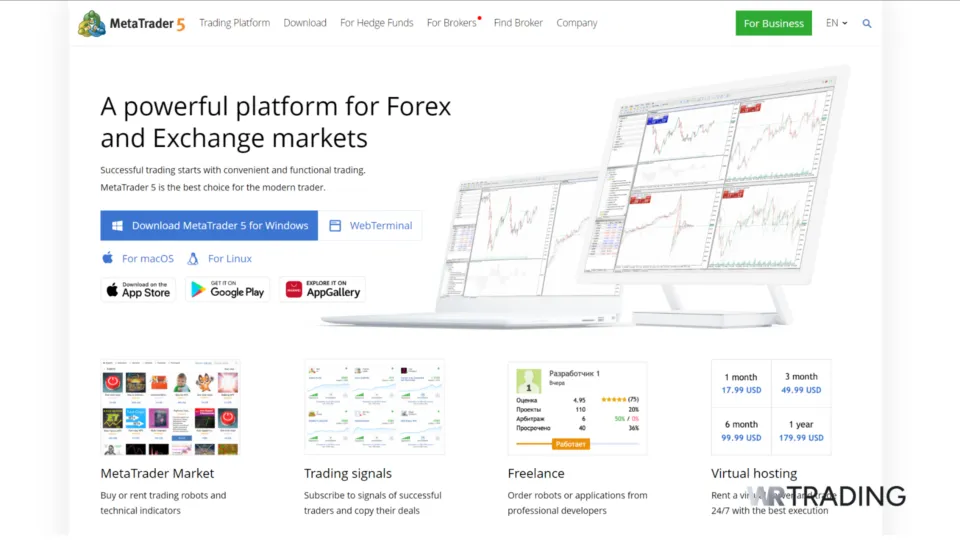
Here’s a step-by-step example for inputting these credentials in a trading platform like MetaTrader 5:
- Open MetaTrader 5: Launch the platform on your computer.
- Go to Tools: In the main menu, click on “Tools” and select “Options.”
- Select the Server Tab: In the Options window, navigate to the “Server” tab.
- Click on New Broker. Enter your broker’s name or select from the list if available.
- Input API Credentials: You will see fields for API key, secret key, and any other necessary information. Enter the credentials you obtained from your broker.
- Test the Connection: After entering the information, click “Test” to verify the connection. If it fails, double-check your entries and try again.
More MT5 Futures Brokers can be found in our in-depth comparison list.
Execute Trades and Regular Maintenance
With everything set up, you can now monitor the markets and execute trades through your trading software. Regularly check for and install updates to ensure your software runs smoothly and has the latest features. Periodically back up your settings and workspace layout to avoid losing them due to technical issues.
Futures Broker vs CFD Broker – Which One Should You Choose?
Futures brokers connect traders directly to regulated exchanges with standardised contracts, while CFD brokers offer broker-driven contracts that allow speculation on price movements without exchange trading. To put it simply, futures brokers provide direct access to regulated exchanges such as CME, CBOT, and ICE, where contracts are standardised in terms of size, expiry, and margin requirements.
This ensures transparent pricing, high liquidity, and tighter spreads, making futures brokers suitable for traders seeking professional-level markets with reliable execution and deep order books. Costs are commission-based, and traders benefit from features like low intraday margins, advanced platforms, and access to micro or mini contracts for risk management.
However, CFD brokers allow traders to speculate on the price of an asset without owning the underlying contract. They are offered through the broker’s dealing desk or liquidity providers, which means pricing is not exchange-traded but broker-driven.
CFDs provide flexibility with smaller contract sizes and no fixed expiry, which can appeal to casual or short-term traders. Still, they often come with wider spreads, overnight financing charges, and weaker regulatory protections. Traders seeking transparent costs and professional-grade execution will find futures brokers better suited to serious trading, while CFD Brokers may suit those prioritising simplicity and lower barriers to entry.
Conclusion
To summarise, we’ve reviewed five top futures trading brokers: EdgeClear, AMP Futures, Dorman Trading, Wedbush, and IronBeam. Each broker offers unique benefits and features to suit different trading needs. While these brokers are among the best in the industry, it’s crucial to align your choice with your specific trading goals and requirements.
However, if you need help deciding, we at WR Trading strive to provide valuable guidance for traders at all levels. Our courses are in-depth and help traders take their experience to the next level. Consider joining our community and learning the top trading strategies.
Frequently Asked Questions on Future Trading Brokers
What Are Futures Trading Brokers?
Futures trading brokers are intermediaries facilitating the buying and selling of futures contracts on behalf of traders. They provide access to trading platforms, market data, and execution services. Brokers offer a range of tools and features to enhance the trading experience.
How Do I Choose the Best Futures Trading Broker?
Selecting the best futures trading broker depends on your trading style, budget, and specific needs. Consider factors such as platform usability, fees, market access, and execution speed. Our top picks include AvaFutures, AMP Futures, Plus500, EdgeClear, Wedbush, and more.
Do Futures Trading Brokers Offer Demo Accounts?
Yes, many futures trading brokers provide demo accounts for practice trading. These accounts allow you to test the broker’s platform and features without risking real money. Demo accounts are a valuable tool for beginners to gain experience.
What Trading Platforms Do Futures Trading Brokers Offer?
Futures trading brokers offer a variety of platforms, including proprietary systems and popular options such as MetaTrader 5, TradingView, and Sierra Chart. These platforms provide tools for analysis, order execution, and market monitoring.
Can I Trade Futures on a Mobile Device?
Yes, most futures trading brokers offer mobile-compatible platforms or apps. These let you trade and monitor markets on the go. Mobile trading ensures you never miss a trading opportunity.











